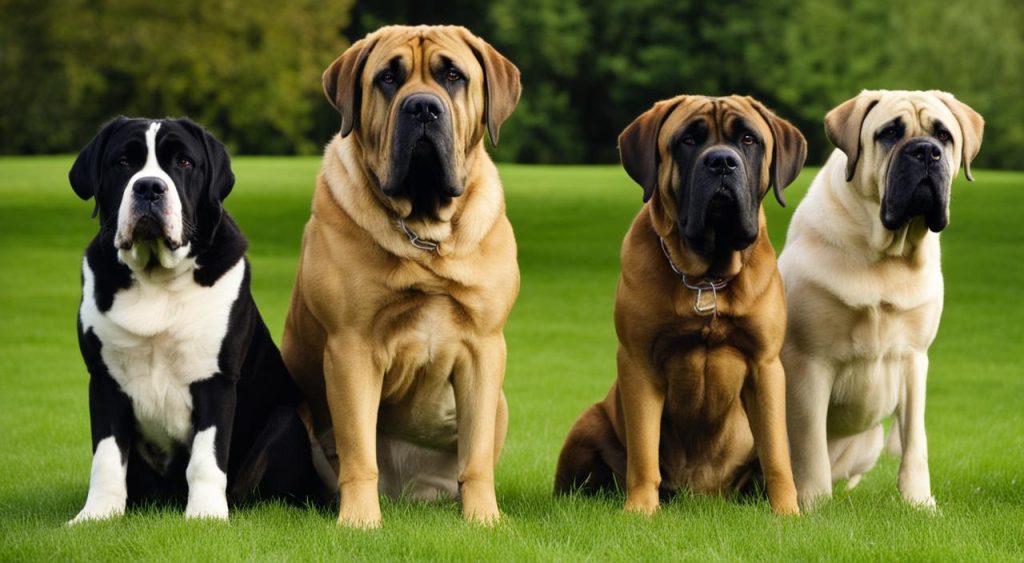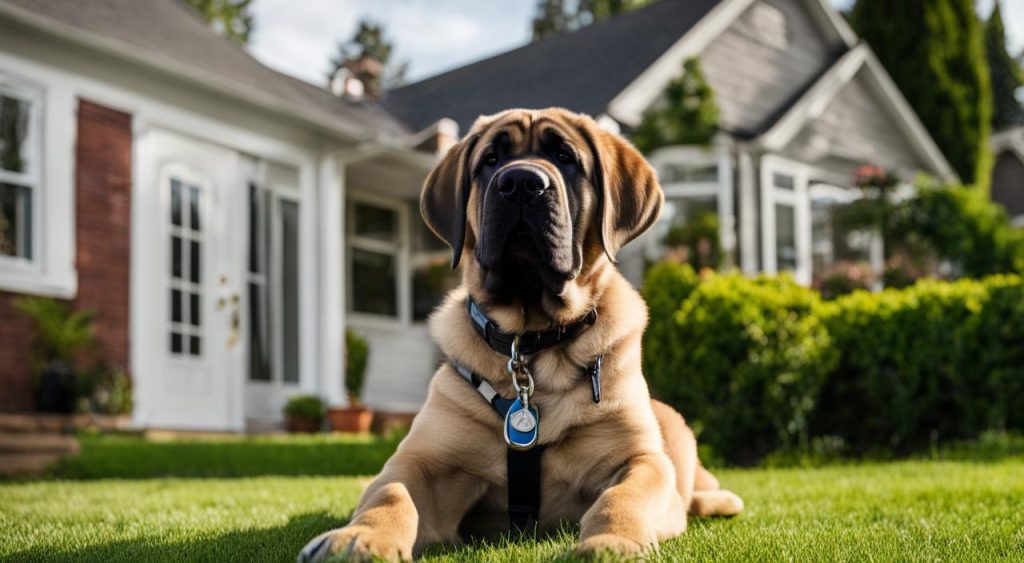Mastiffs are known as gentle giants, often being protective of their family. They have a generally affectionate and gentle temperament, making them suitable companions for children. Mastiffs typically get along well with other dogs and cats, but supervision is recommended, especially with small children, due to their size. Mastiffs can make good apartment residents due to their gentle nature and low exercise needs, although the presence of stairs should be considered. They have a protective nature and can make good watchdogs, often barking to alert their owners to strangers.
To ensure a stable temperament and positive interactions with other dogs and animals, early and frequent socialization is important for Mastiffs. They are generally good-natured, but some individuals may display timidity or aggression. Responsible breeders prioritize breeding for temperament and work to produce friendly and well-behaved dogs. Mastiffs are intelligent and sensitive, responding well to patient and consistent training techniques. It is essential to establish firm and consistent leadership to earn their respect and ensure good behavior. Mastiffs tend to be calm and quiet indoors but still require moderate exercise to stay in shape and avoid weight gain.
In conclusion, Mastiffs are an ancient breed known for their large size and protective nature. They have a rich history and have played important roles in guarding and protecting humans for centuries. While they can be compatible with other dogs and breeds, it is important to supervise their interactions, especially with small children. Proper socialization, training, and care are crucial for maintaining a stable and well-behaved Mastiff. Despite certain health concerns, with proper care and attention, Mastiffs can live a happy and healthy life as loyal companions.
Key Takeaways:
- Mastiffs have a generally affectionate and gentle temperament, making them suitable companions for children.
- Mastiffs typically get along well with other dogs and cats, but supervision is recommended, especially with small children.
- Early and frequent socialization is important for Mastiffs to ensure a stable temperament and positive interactions with other dogs and animals.
- Mastiffs are intelligent and sensitive, responding well to patient and consistent training techniques.
- Proper care, including a balanced diet, regular exercise, and regular veterinary check-ups, can help mitigate health concerns and ensure a happy and healthy life for the Mastiff.
Factors that Influence Mastiff Dog’s Social Behavior
The temperament of a Mastiff dog can be influenced by various factors. Early and frequent socialization are crucial for developing a stable temperament and promoting positive interactions with other dogs and animals. It is important to introduce your Mastiff to a variety of situations, people, and animals to ensure they grow up to be well-rounded and friendly.
Mastiffs are known for their generally good-natured temperament, but it’s important to note that individual dogs may exhibit timidity or aggression based on their unique personalities and experiences. Responsible breeders prioritize breeding for temperament, choosing dogs with friendly and well-behaved traits to ensure future generations of Mastiffs with good temperaments.
Training is also key in shaping a Mastiff’s social behavior. Mastiffs are intelligent and sensitive dogs that respond well to patient and consistent training techniques. It is essential to establish firm and consistent leadership to earn your Mastiff’s respect and ensure proper behavior in social situations. Positive reinforcement methods and reward-based training work best with these gentle giants.
While Mastiffs tend to be calm and quiet indoors, they still require moderate exercise to stay in shape and prevent weight gain. Regular walks and playtime help fulfill their physical and mental stimulation needs. This, in turn, can positively impact their social behavior, as exercise helps keep them balanced and content.
Conclusion
Mastiffs are a remarkable breed with a fascinating history rooted in their large size and protective nature. They have been loyal companions and guardians for humans for centuries, earning their place among the most ancient breeds. With their impressive stature and dignified presence, Mastiffs have distinctive breed characteristics that set them apart, including their extra-large size and propensity to drool and slobber.
Despite their imposing appearance, Mastiffs are known for their gentle and good-natured temperament. They are highly loyal and eager-to-please dogs, making them wonderful companions for families. However, it is crucial to be aware of certain health concerns that affect this breed. Mastiffs are susceptible to joint and musculoskeletal issues, heart disease, and, unfortunately, shorter lifespans compared to smaller dog breeds.
To provide the best care for your Mastiff, it is essential to prioritize their health and well-being. Regular exercise, a balanced diet, and routine visits to the veterinarian can help mitigate potential health concerns and ensure a happy and fulfilling life for your beloved Mastiff. By understanding their breed history, characteristics, and potential health challenges, you can provide the love and care necessary to keep your Mastiff thriving for years to come.





